![]()
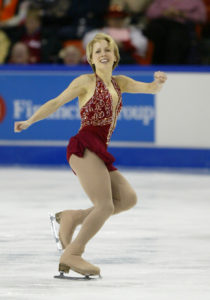 “Standing Ovations”
“Standing Ovations”
by Lesley Hawker
It’s 2002 and I am a 20-year-old skating in my first national championships ever. My debut is as a senior and I have been shadowing Jennifer Robinson, in hopes that whatever she does will rub off on me! I never made nationals at the novice or junior level and as I stepped onto the ice for my short program I breathed in all that amazing energy that comes only at the Canadian championships. The music, the cameras, the judges and the crowd. I don’t remember being scared (that feeling only creeps in with years of experience). I hit my opening pose and the music started, I seemed to float through the two opening jump passes. I came back to earth when I almost fell on the flying camel but continued to push through and finish with a clean short. My hands flew to my face as soon as the music ended. I watched my coach jump up and down and I bent forward crying, laughing and amazed that I had done it. And then the real surprise, as I went to take my curtesy everyone was on their feet. A standing ovation. Standing ovations were always my favourite reward.
It’s hard to believe that very special day was over 16 years ago. My running joke is “when did I become a middle-aged mother of four?” I still feel like that young twenty-year-old enjoying the moment. That 2002 short program really catapulted me into a crazy 8-year dream career full of successes and failures, friends and adventures.
When I retired from competitive skating at 28 years of age, I was ready. Unfortunately, I wasn’t very prepared! The funny thing was, I really hadn’t thought of much besides training plans and schedules. What did I want to do outside of skating? I was already “old” at 28 when I retired. I had dabbled in university but wasn’t sure I was cut out for academics. I felt guilty for quitting skating when I did, feeling I had somehow let down my husband, my family, my skating community, and I even felt like God was disappointed. In those early months after retirement the hardest part was feeling torn about moving on with my life while I still turned my head back to see what I had left behind. I did what I do best. I threw myself into work. Coaching was something I knew, it was fulfilling, and it kept me busy! Still, it felt often like I was walking around leading someone else’s life. Wasn’t I supposed to be flying to another competition somewhere?
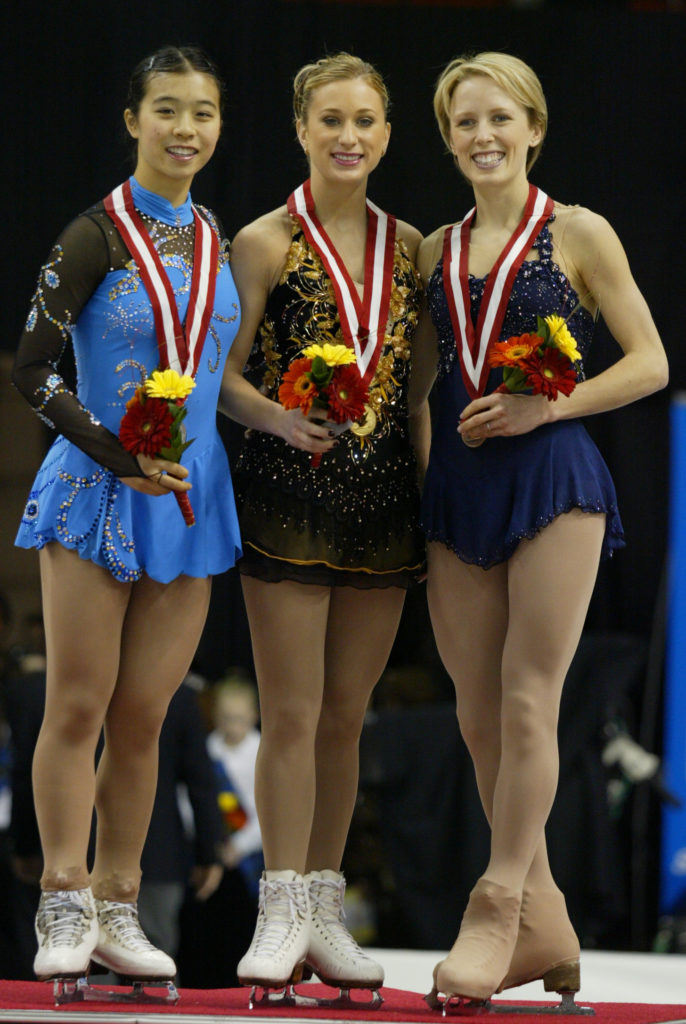
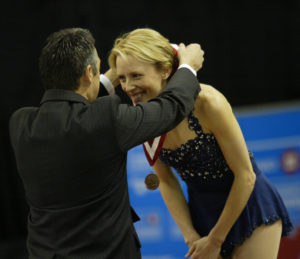
Towards the end of my skating career I felt this strange unease with the selfishness it sometimes takes to be a top elite athlete. I yearned for a time where my family’s schedule would not be dictated by when I had to leave for a big event. I wanted to step back and help others find the joy in their lives that skating had brought into mine. Some of my favourite coaching moments are when the skaters and I just play. I love helping them listen and feel the music. Sometimes we just like to roll around and feel how cold it is!
From the age of about 10, my main goal in life had been to compete at the Olympics. I didn’t quite make it that far but by dreaming about that big goal, I’ve been to places I never dreamed possible.
In 2010, two years post retirement, I found my second major life dream, my children. My first son Conor was born and immediately my life took on a new purpose and focus. These days, with my kids my main priority, I can truly say that parenting is much harder than skating in front of thousands of people, yet I find that the skills I learned at the rink help me every day just like everyone always said they would, even when it comes to parenting. Just like in skating, you make mistakes and you have to get back up again. Until my children were born, I was beginning to think that I might never find something else that took all of my mind, body and soul. I’ve discovered that while raising kids may be harder than skating, the satisfaction and fulfillment is even greater.
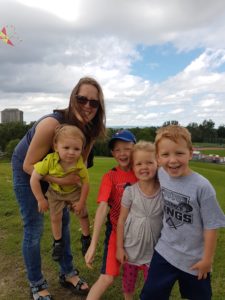 What do you do with all that passionate energy that it takes to be an elite figure skater? Well, in my case I’ve thrown it into a couple of areas. My kids are my life. I love encouraging their interests and helping to guide them through this crazy world. I work with skaters at our local club on choreography and spins. I’ve recently started working with hockey players and that is a lot of fun. While I haven’t had a lot of time recently, I am a challenge level technical specialist too. This is a great way to stay current with this ever-evolving sport and I love to stay in touch with all my old friends.
What do you do with all that passionate energy that it takes to be an elite figure skater? Well, in my case I’ve thrown it into a couple of areas. My kids are my life. I love encouraging their interests and helping to guide them through this crazy world. I work with skaters at our local club on choreography and spins. I’ve recently started working with hockey players and that is a lot of fun. While I haven’t had a lot of time recently, I am a challenge level technical specialist too. This is a great way to stay current with this ever-evolving sport and I love to stay in touch with all my old friends.
A little secret … I developed a slightly obsessive hobby just after I retired. I am a full-fledged knitting addict. If you follow me on Instagram @athletetomommy, that’s all I post about. There is something about the rhythm of knitting that helps calm me and keep me sane with my busy life. I always have a project with me wherever I go. Oh, how I wish I knit when I was a competitor! It’s so good for nerves.
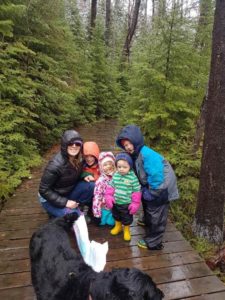
It took me quite a long time to find myself again after I retired. I had to see who I was, not just as Lesley the skater, but now, Lesley the person. If I could go back to that time just after I retired I would slow down a little, talk to a few more friends and not make any big decisions about the future. I found out that I really didn’t know who I wanted to be outside the rink. It takes time. I still love watching skating and keeping an eye on all the current skaters. I’ve especially enjoyed watching fellow contemporaries find success on some of the biggest stages in the world.
Even now, it is rare for me to be at any skating competition or event and not have someone approach me and say, “I was there in 2002 for your short program” or “that was an amazing moment in 2002.” I have often looked back on my career and regretted that I didn’t accomplish more. More medals and better results would certainly have left me feeling more fulfilled, right? But the wonderful fans, friends and family who shared those special, intimate moments on the ice with me are also my constant reminder that I never skated for medals or money. I skated because I loved it.
![]()
On the Nature of Work: Alexandra Paul and Mitch Islam
by Jacquelyn Thayer
In the disciplined realm of Olympic-level competition, an athlete by necessity must take a rather hazy view of the land beyond the horizon. Those whose career is premised on physical conditioning and vigor must make much of time; it is little accident that the Games ring in with a call out to the youth of the world.
The lucky ones — those made for big league, big money sport — can pursue an almost ordinary path, pushing their first career into middle age, maybe transitioning success and talents on the field of play into a related, physically gentler gig like color commentary or coaching. The great majority of Olympians, though, face down the unenviable prospect of a certain quarter-life swerve.
 Alexandra Paul and Mitch Islam after graduating from Oakland University, April 2017. (Photo courtesy of Debbie Islam.)
Alexandra Paul and Mitch Islam after graduating from Oakland University, April 2017. (Photo courtesy of Debbie Islam.)
Canadian ice dancers Alexandra Paul and Mitch Islam achieved rare success — a medal at the 2010 World Junior Championships in their debut season; multiple top three finishes at the senior national championships; a trip to the 2014 Olympics after that year’s national bronze. It’s a record most in the sport can envy, but relative to the achievements of the world’s most decorated — like countrymen Tessa Virtue and Scott Moir, who can claim two Olympic ice dance titles and far more hardware beyond that — it’s a record with limited reach.

Consider it the difference between college play and the major leagues — high-profile professional skating shows, along with sponsorships and endorsement deals, are scarce in themselves, reserved for that uppermost echelon of world-beaters.
But while many athletes have struggled with the transition from competitive life to the career track, Paul, 26, and Islam, 28, were keenly aware of the need to prepare for a second stage.
“For me,” said Paul, “the transition seemed kind of natural, because we had both been working so hard throughout our skating careers to ensure that we had something planned for once we retired.”
The road to athletic greatness is usually marked by a few literal journeys. In 2012, the on- and off-ice couple, whose careers apart and together began at the Mariposa School for Skating in Barrie, Ontario, moved 450 kilometers southwest to train at the Detroit Skating Club, where world-class coaches and skaters could push the promising team to new heights. They were also student athletes of a type, transferring undergraduate studies from Ontario’s Laurentian University to Oakland University in Rochester Hills, Michigan.
On the ice, the move proved a career boon. Off the ice, it introduced the Canadians to a concern known well by their American peers. Oakland helpfully offers an in-state tuition scholarship for Canadian students on a full-time schedule, criteria that Paul and Islam met in 2012. The latter stages of upper level coursework, though, paired poorly with later training requirements — not helped further by the couple’s move in 2015 to train in Montreal, limiting them to online class offerings for the year and a half they lived out of state. The non-resident tuition rate took effect.
While Oakland’s costs compare favorably with those of many private universities, even its reduced rate is significantly higher than the standard for most Canadian schools. It “was definitely tough on our families and on us financially,” said Paul. “American schools are not cheap and they’re not known to be cheap.”
“A lot of it had to do with the dollar, too,” added Islam. “The first two years we were [at Oakland], the dollar was on par. It was beautiful. And the last year we were there, they dropped our full-time status and the dollar went down to about $0.79. So we were paying, you know, tens of thousands of dollars for a semester of school. My parents joke it’s the most expensive degree ever earned.”
When disappointing results and recurring injury tipped the balance away from competitive skating’s allures, the possibility of finally wrapping up that long undergrad career was tantalizing. The couple retired in December 2016 — still months away from the competitive season’s conclusion — with the explicit aim of graduating in the spring semester. Four months later, the two picked up a matching pair of Bachelor of Arts degrees, cum laude, in political science.
For Paul, the plan also meant time to move forward with phase 2 of her academic goals: the LSAT and law school applications. She promptly entered the University of Windsor’s Faculty of Law in fall 2017, concluding her 1L year in April.
“Skating has a timeline,” said Paul, who battled a more than typical share of injuries over her six-year senior career. “You can’t go to school then hope to come back to skating, whereas you can skate until your body can’t handle it, and then school is always an option later in your life. There’s no timeline for school.”
Though the job outlook for law graduates in recent years has led some JDs to seek alternate venues for their skill set, Paul’s sights are presently set on the legal profession.
“I know that a law degree is such a well-respected degree that it can open so many avenues for you, and so that will definitely be something that I look into in the future,” she said. “But as of right now, I’d like to use my law degree as a lawyer.”
Islam’s current career path — one established from an early point — has kept him closer to the rink. His father, David, was the couple’s first coach; Islam himself began coaching when still a teenager. After resuming the work in early 2017, he’s now on the full-time staff at Mariposa, working with young dancers and with the school’s hockey skating program, and envisioning a return to glory for a skating school that produced several past Canadian champions.
“I think what I’ve learned in this year is that I’m very passionate about coaching,” he said. “I love to teach, I love to help people.”
A second gig, as a technical representative for boot manufacturer Jackson Ultima, can be credited to fortuitous timing: in early 2017, Jackson vice president Raj Misir asked if he was looking for a job.
“I’ve learned a ton,” said Islam, whose primary previous off-the-ice work experience was an internship with Special Olympics Michigan. “I feel as though I’ve been exposed to business situations that I may not have this early on in my life, which is [due to] the lack of experience that I have in that realm. So I feel very fortunate. I’m involved in meetings, I’m involved in product development, I know the company direction, this kind of stuff.”
On long distances
For summer, though, Paul is back in Barrie, coaching and choreographing for ice dancers and singles skaters at Mariposa as well as teaching off-ice ballet at the rink. It’s work that offers a refreshing return to the athlete’s norm after the physically idle nature of study.
“I’ve never actually gone to class every single day of the week since I was in high school, so this is something that’s very different for me,” she said with a laugh. “I sit still for so long every day that it drives me crazy sometimes. I put fitness equipment in my basement […] and it kind of gets me through the next couple hours of sitting still. But that definitely has been one of the biggest adjustments, is just not moving around as much as I used to.”
On teaching dance to skaters
“One of the considerations, of course, at the end of our career was are we earning money doing this? Because as you do get older, that is a consideration that is important,” said Islam. Institutional funding covered the costs of training, allowing the team to break even, but opportunities to earn through work were limited. Student visa status during their years in Michigan barred them from any non-scholastic employment in the States, while chances to earn via competition prize money and skating show appearances were few and far between.
“That wasn’t in any way a huge contributing factor to our decision to retire,” he continued. “But I’ll tell you that it is definitely nice for me, now that I’m working lots, that I can put some money in the bank and I can save money.”
There’s a sort of tunnel vision that both creates and sets apart the elite athlete from friends and family with more traditional pursuits. Fellow competitors can offer the camaraderie of the trenches; civilian friends can remind one of what’s on the other side.
“We have lots of friends outside the sport as well, and you see them getting jobs and graduating, getting married and having kids and all these things,” said Islam. “It wasn’t too difficult for me personally just because I knew that skating and training and going to school part-time was the direction for me, and it was what I wanted to be doing, so I think just having that confidence in your direction is key. But definitely there’s two sides to it. You feel a little bit of that pressure from life, and especially later on in our career, when we were kind of feeling like we were ready to move on — that created a little more pressure.”
While the athlete’s goals are past, more workaday concerns have taken their place. For Paul, the focus is necessarily immediate.
“Goals for me right now are to get through law school, do well, and get a position at a firm, ideally in Toronto,” she said. “So my goals are pretty much within the next four years to be working in Toronto and be getting ready to branch out on my own.”
But, as Islam suggests, neither does the Olympian’s long-term vision dissipate; it is, simply, transmuted.
“Long-term goals right now are kind of a blank slate when you’re not 100% sure where you’re going to end up,” said Islam. “I think that my goal is to be happy with what I’m doing. I’m more effective when I’m happy, and if I’m passionate about what I’m doing, I’m giving you all of me and that’s going to translate into things that you need. For me, in terms of my students, when I’m not happy, I kind of introvert and become half the person that I feel like I am. Right now, it doesn’t feel like when I wake up in the morning that I’m going to work, and I think that is an incredible feeling, and I know I’m very fortunate to have that opportunity. So I think I want to be happy and I think that I want to use that energy and that passion to help people and to make the best better “

![]()
Jeanne Chevalier and pair partner Norman Scott won the 1914 Canadian pairs title.
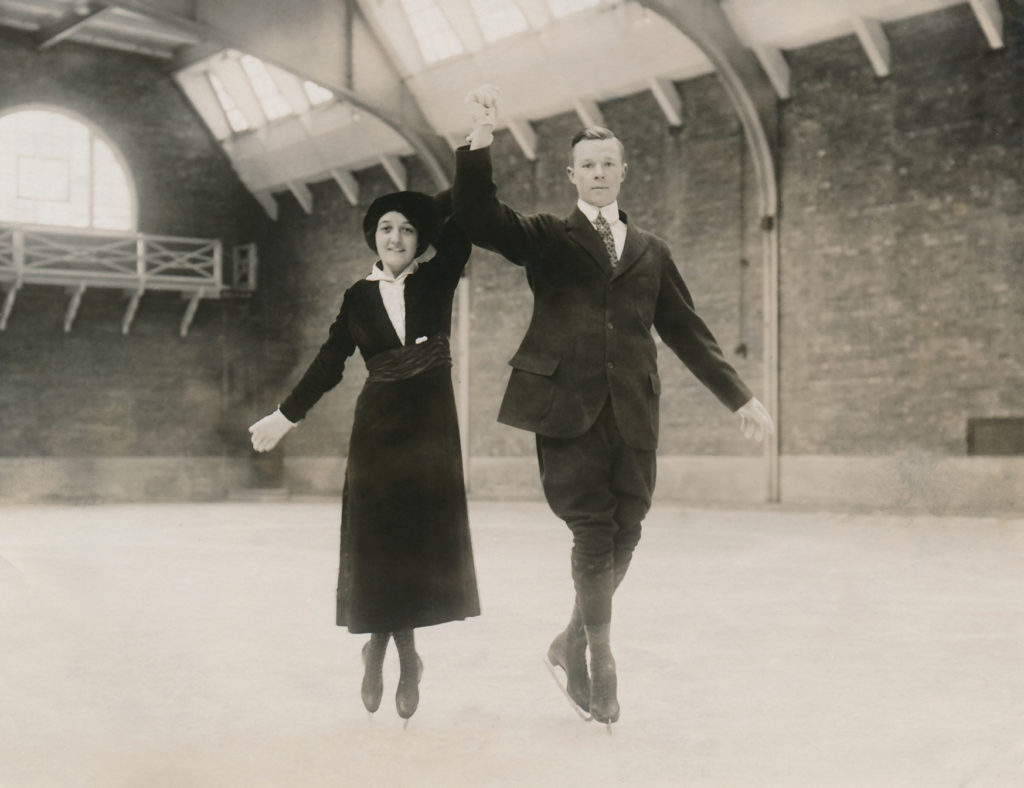
![]()
January 2019
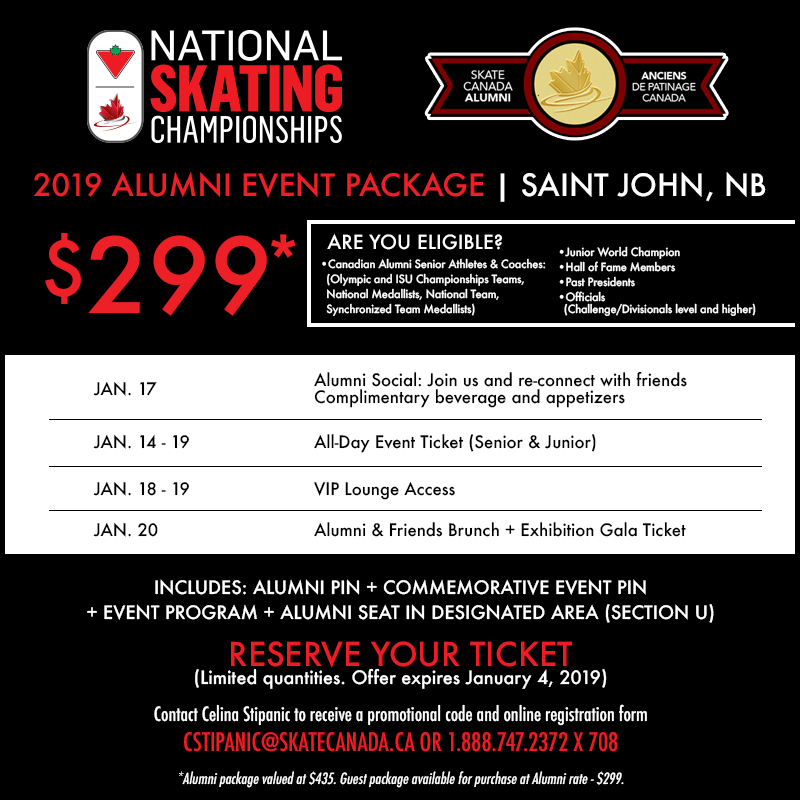
December 2018
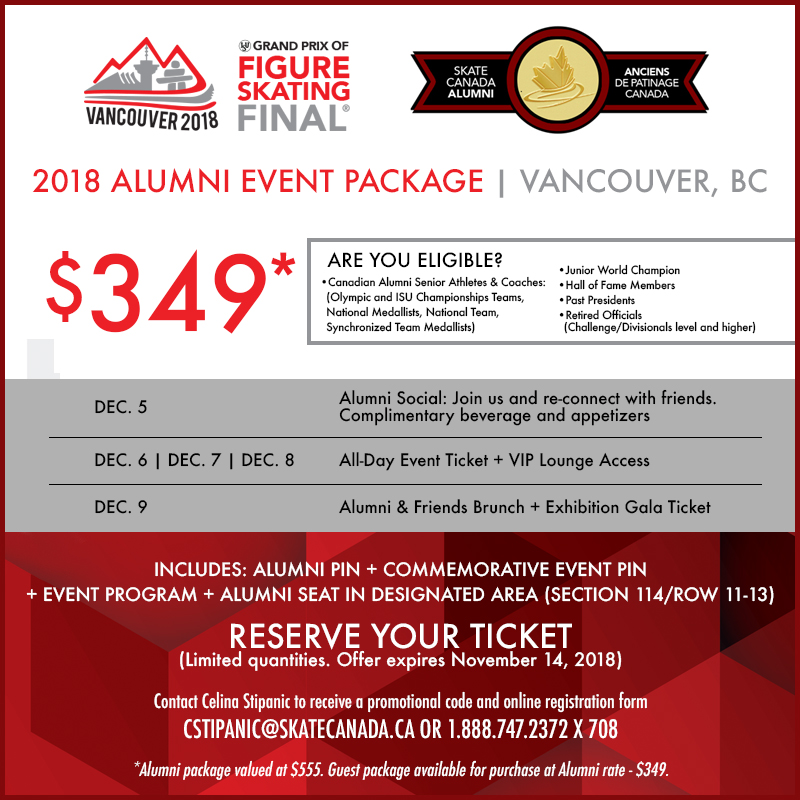
![]()
We’d love to hear from you! Today staying in touch is easier than ever!
E-mail us your stories, photos, thoughts, suggestions and questions. We can’t guarantee we’ll print each one however we will certainly read every word and in the case of questions, find answers to them all.
Contact Celina Stipanic, Alumni and Fund Development Manager at [email protected]
